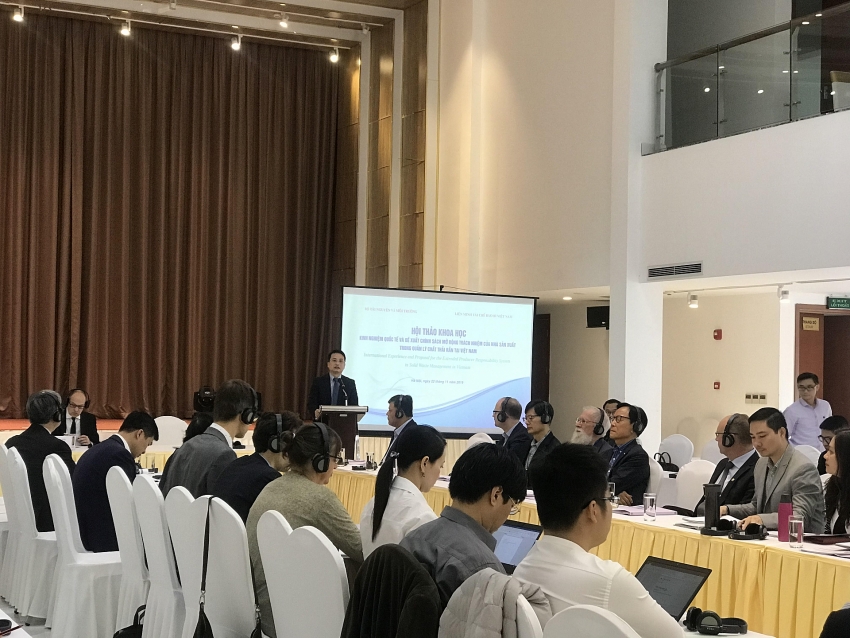Extended producer responsibility in solid waste management
 |
| The workshop on extended producer responsibility in solid waste management |
On November 22, 2019,Workshop on Extended Producer Responsibility in Solid Waste Management took place at the International Convention Center in Hanoi co-organised by the Ministry of Natural Resources and Environment (MoNRE) and Packaging Recycling Organization Vietnam (PRO Vietnam).
EPR is most commonly defined as “an environmental policy approach in which a producer’s responsibility for a product is extended to the post-consumer stage of the product’s life cycle”. The application of EPR legislation not only to shifts the financial burdens on public budgets and taxpayers to producers but also helps improve recycling and reduce landfilling. Therefore, EPR has been widely adopted in most OECD countries since the 1980s as one of the key policies to respond to the challenges of solid waste growing in both volume and complexity.
In Vietnam, the EPR concept has been first introduced in the Law on Environmental Protection 2005, with several supplements and adjustments in 2015. That was followed by the Prime Minister’s directive on the collection and recycling of solid waste in 2013, then revised and supplemented in 2015. However, the current EPR schemes are only modestly effective due to the lack of comprehensive targets and application areas, effective financial tools, or detailed guidance in implementation. In this context, the need for a more comprehensive EPR system as part of the National Action Plan is a priority issue for Vietnam.
Pham Tuan Hung, head of the Legal Affairs Department of the MoNRE shared, at the workshop: “Building a comprehensive EPR legislation is an integral part for the National Action Plan of Vietnam in tackling solid waste, especially plastic waste. Hence, we give recognition and appreciation for open dialogues with multiple stakeholders in public policy development and consider this as data for improving the EPR legislation to assure comprehensiveness, shared financial responsibility, and long-term financial sustainability. In my personal view, I believe that building and implementing an effective EPR system will be a critical factor in advancing the circular economy in Vietnam.”
According to the proposal on EPR legislation enhancement to the MoNRE, PRO Vietnam affirmed the important role of producers, brand owners, distributors, retailers, import-exporters in managing and recycling post-consumer packaging waste to minimise the impacts on the environment. In fact, it would be unrealistic to try and “copy-paste” an EPR approach from one country to another. Each country faces unique challenges and must develop its own approach to meet its specific environmental, social, and economic conditions.
| Laurent Levan, president and CEO of URC Vietnam shared: “As a part of PRO Vietnam, the coalition’s activities would ensure a reconcilement of economic, social and environment beneficial factors and a balance between producing convenient products with protecting the environment. Together with 12 members of PRO Vietnam and moving forward to new decade, URC Vietnam is persistently pursuing a sustainable development and support the ERP system, as it would be key competitive advantage that enables all the corporations to operate more efficiently and better serve the consumer”. |
At the workshop, Fausto Tazzi, vice chairman of PRO Vietnam, stated, "PRO Vietnam with the participation of 12 leading brand owners, packaging producers, and distributors have strong commitments to sustainable packaging. In general, an EPR system aimed at recycling post-consumer packaging waste is to enable the successful growth of recycling while maintaining a level playing field for all packaging materials. We treasure the opportunities for open discussions and opinion-sharing to support the development of EPR in waste management and packaging recycling growth for a greener Vietnam."
Discussed topics at the workshop include ERP models and their pros and cons in improving solid waste management, as well as successful EPR models in the world (Korea, Taiwan, and South Africa), understanding the context of Vietnam, and recommendations for EPR development in Vietnam.
The workshop was organised under the framework of the MoU signed by the MoNRE and PRO Vietnam in last September to promote activities in reducing, segregating, collecting, and recycling waste and fostering the development of the circular economy in Vietnam. This workshop is one of the various programmes organised by the MoNRE to prepare the proposal to adjust and supplement the Law on Environmental Protection which is expected to be submitted by the government to the 9th National Assembly in 2020.
What the stars mean:
★ Poor ★ ★ Promising ★★★ Good ★★★★ Very good ★★★★★ Exceptional
 Tag:
Tag:
Related Contents
Latest News
More News
- VNPAY and NAPAS deepen cooperation on digital payments (February 11, 2026 | 18:21)
- Vietnam financial markets on the rise amid tailwinds (February 11, 2026 | 11:41)
- New tax incentives to benefit startups and SMEs (February 09, 2026 | 17:27)
- VIFC launches aviation finance hub to tap regional market growth (February 06, 2026 | 13:27)
- Vietnam records solid FDI performance in January (February 05, 2026 | 17:11)
- Manufacturing growth remains solid in early 2026 (February 02, 2026 | 15:28)
- EU and Vietnam elevate relations to a comprehensive strategic partnership (January 29, 2026 | 15:22)
- Vietnam to lead trade growth in ASEAN (January 29, 2026 | 15:08)
- Japanese business outlook in Vietnam turns more optimistic (January 28, 2026 | 09:54)
- Foreign leaders extend congratulations to Party General Secretary To Lam (January 25, 2026 | 10:01)






















 Mobile Version
Mobile Version